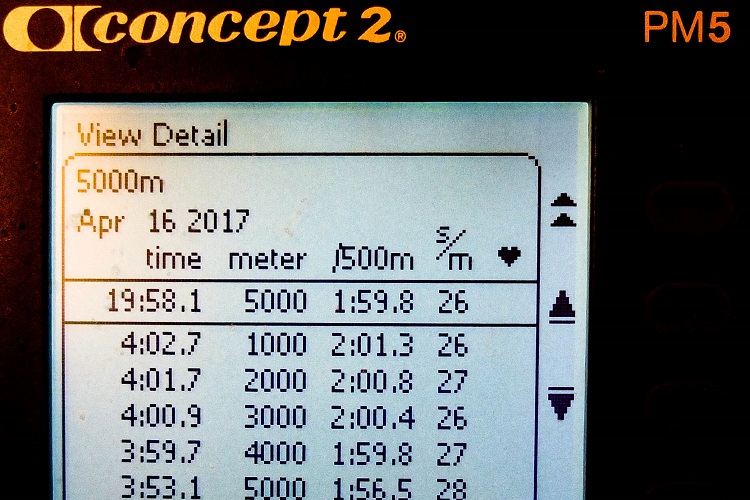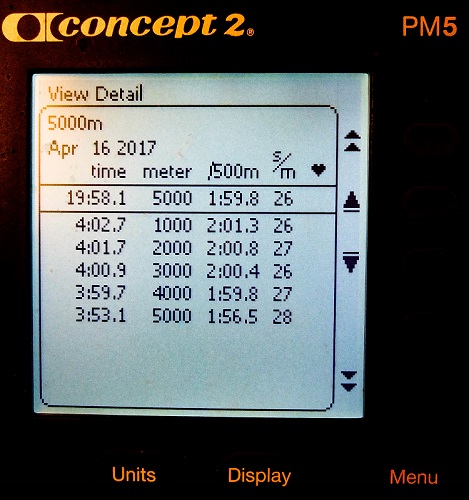

By Michael Krueger
If you are still reading despite the title of this column, I’m impressed. Cardio training is perhaps the toughest sell in fitness besides diet. It’s hard mentally and physically yet so important to overall fitness that it can’t be ignored–or at least it shouldn’t be.
Too many people say that they like to walk for their cardio. I’m sorry to say this, but while walking is very good for you in many ways, it isn’t really cardio training unless it gets your heart rate into your training zone. It’s a great activity and I do a lot of it, but unfortunately it’s not cardio training.
So if you’re still with me here, let’s get into what cardiovascular training is all about.
Training Zone
I’m a bit of a purist when it comes to cardio. I feel that cardio training is what you do to improve your heart and lungs’ ability to provide oxygen-rich blood to your working muscles. Your ability to perform better aerobically in your sport, job, or activity is a side effect of your trained and efficient cardiovascular system. When you try to multitask cardio training with playing or practicing a sport, then your focus suffers because of the demands of play or practice, and your intensity suffers because of the uncontrolled pace of play. I feel that you should train your cardiovascular system outside of your sport so that when it comes time to focus on the game, your endurance will not be a limiting factor in your performance.
There are a lot of ways to define cardio training, but it’s basically when you get you heart rate up to 60 to 80 percent of your maximum heart rate for at least 20 minutes. There are numerous formulas to determine what your maximum heart rate is and then figure from there what your training zone should be. They’re all more or less good, but they are estimates. If you have a chance, by all means get a stress test in a lab so that you can find out exactly what you maximum heart rate is. Once you know that, you can really tune in your training.
If you don’t care to go the lab test route, then on a practical level I’m a big fan of the “talk test”; it’s simple and intuitive. The idea is that you work up to a point where you can’t speak a full sentence but can say three words at a time. A variation is that you can talk but you can’t sing or whistle. Either way, particularly for beginners, it’s a decent way of determining if you are working hard enough.
Of course “working hard enough” is where the trouble with training starts. We instinctively don’t like to do anything that makes us uncomfortable. Training will make you very uncomfortable, so it’s hard to keep up the pace once it gets even a bit difficult. To consciously maintain a state of being uncomfortable for 20 minutes takes a lot of discipline. Most people back off or quit as soon as they feel “out of breath,” and while that’s a natural reflex, it’s the exact opposite of what’s needed to elicit a training effect.
There is a thing called the VO2 max and another called the anaerobic threshold. These both come into play when talking about cardio training, and if you are serious about it, you’ll want to learn more about them. I’m not going to get into them here because it’s rather dull reading and I want to focus less on the technical and more on the practical.
In the Beginning
If you’re used to doing a few minutes on the treadmill or stair stepper and then calling it cardio, then this might surprise you: You’ve been doing it wrong. This is where the “at least I’m doing something” delusion takes hold. People believe that because they plod along for a while that they’re getting a good workout. If you can watch TV or read while doing your cardio, then you aren’t focused, you aren’t listening to the feedback you’re getting from your body, and you aren’t working hard enough. You’re burning a few extra calories and it’s certainly better than sitting on your backside, but you aren’t getting any appreciable training effect.
Unfortunately, many if not most people use cardio activity for weight control. This is not what it’s for; you get lean in the kitchen. Cardio training is for strengthening your heart and lungs, not to burn calories. You’ll use some additional calories over being sedentary, but it’s an inefficient way to lose weight. On the other hand, cardio is the perfect way to improve your body’s ability to take in and use oxygen and also to improve your mental toughness.
Obviously, firefighters know the value of oxygen. You take it with you whenever you go out on a call. You learn how to efficiently breathe while using an SCBA. You know exactly how much time you have on a tank and if you run out of air you will die. Understanding this, you’d think that every firefighter would regularly train their cardiovascular system to make it as strong and efficient as possible. Well, in my experience, this is not the case.
The fact is, most people who even do cardio don’t do it progressively. When they start out (if they consistently keep at it) they will begin to notice improvements. The can go a little longer or a little faster, they might notice a little better recovery, and perhaps they don’t absolutely loathe the thought of doing it again. They even might say they almost sort of enjoy it.
This is the point where the next problem begins.
Hard Work … Always
Progressive cardio is hard, very hard; there is no other way to describe it. Keeping a good log so that you understand what your training is doing so that you can plan to improve is imperative. A log can also keep you motivated and on track when the going gets really tough.
No matter what mode of exercise you use, progressive cardio requires that you work hard, all the time. There will be days that aren’t as heard as others, but they are still going to be tough. Once you learn to train hard, it’s a tough place to stay, and progressing from there is even harder.
To train successfully and progressively, you’ve got to accept the fact that you’re going to be uncomfortable. Your muscles are going to hurt, your lungs are going to burn, and a part of you is going to insist that this is crazy and that you should stop. Of course, to be successful, you’ve got to acknowledge all of this and still push on.
As you continue training, the time you are able to perform at a training pace will improve. Physically, the efficiency of your heart and lungs will improve and your muscles will get stronger. By this point, your body will do whatever you ask of it until it simply can’t and it shuts down. Part of this is physical and part is mental. (Actually, it’s all mental, but it doesn’t feel that way.) Once your body gets with the program, it will send you a lot of feedback on muscle movement, fatigue, breathing, and fuel supply, and no matter what, it won’t quit until you tell it to or it crashes. I’m not necessarily advocating pushing until you crash, but it’s possible to do; I know because I’ve done it.
So, while your body adapts and becomes stronger and more efficient, your mind will become tough as nails. You will get to the point where you know you are in total control of the effort you are putting forth. At that point, you won’t quit when you’re tired. You’ll stop when you’re done, and that’s a productive yet painful place to be.
Not everyone is willing to train that hard. People have questioned my sanity when they see how hard I train (particularly because I train for training’s sake, not to improve athletic performance). They don’t understand this–in part, because they have never done it.
It takes a while to get to where you can train really hard, because you must find your own way; it’s not a straightforward formula of heart rate and lung capacity since so much of it happens in your head. At first it’s a scary place to go, then it’s humbling and embarrassing when you realize how soft, weak, and undisciplined you were and how much time you’ve wasted on ineffective exercise. Then it becomes terrifying when you realize how hard you can train, how your mind can push your body, and how amazingly your body will respond … and then it’s the biggest rush you can imagine!
It Takes Time
Training your mind and your body to push past your comfort zone takes time. I’m not going to kid you: The first time you go harder or faster than you’ve ever gone before, it will be awful. The second time won’t be any better either … not even the 20th time, or ever.
The thing is, it never gets easier, you just get stronger and tougher. Soon it takes twice as much work and intensity to get you to feel as bad as you did the first time, and that’s a good thing … no, it really is!
So, decide whether you want to train hard and progressively or if you just want to put in time. Are you going to use your cardio to burn a few calories you shouldn’t have eaten in the first place or are you going to use it to make your heart and lungs strong and efficient? Are you going to use it to become mentally and physically tough, so that when you need it most you will have that toughness at your command?
Are you ready to accept the challenge of true cardiovascular training?
Remember, when cardio training is done right, it’s the hardest thing you will ever do …
and the best.
Michael Krueger is an NSCA-certified personal trainer. He got his start in fitness training while serving in the United States Coast Guard. He works with firefighters and others in and around Madison, Wisconsin. He is available to fire departments, civic organizations, and athletic teams for training, consulting, and speaking engagements. He has published numerous articles on fitness, health, and the mind-body connection and was a featured speaker at the IAFC’s FRI 2009 Health Day in Dallas, Texas. E-mail him at MKPTLLC@gmail.


